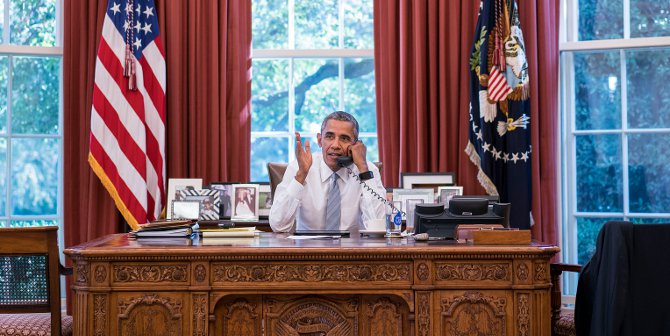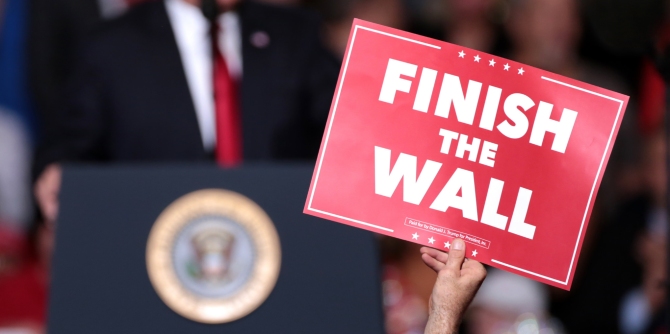 President Obama’s unilateral directives on gun control issued last week have been praised by his supporters and described as “imperial overreach” by his detractors. Despite this approval and opprobrium, Joshua Kennedy argues that the measures announced by Obama are not “executive orders”, but are simply a collection of suggestions, requests, and minor rulemaking steps which do little to contradict existing laws, and may well be discarded or changed before they can be implemented.
President Obama’s unilateral directives on gun control issued last week have been praised by his supporters and described as “imperial overreach” by his detractors. Despite this approval and opprobrium, Joshua Kennedy argues that the measures announced by Obama are not “executive orders”, but are simply a collection of suggestions, requests, and minor rulemaking steps which do little to contradict existing laws, and may well be discarded or changed before they can be implemented.
Last week brought a fresh discussion of unilateral directives from the Obama administration, this time dealing with the topic of gun control. President Obama has been routinely vexed by a seeming inability to get legislation dealing with this issue through Congress, and his frustration apparently reached the point where he was willing to take action on his own. How one reacted to this news could largely be analyzed along expected lines: those inclined to support the President celebrated his willingness to “act”, and those opposed to further gun restrictions decried the use of “his imperial overreach”. But the true story of these directives is not so neatly summarized, and both opponents and proponents of presidential action largely overstate their importance.
In fact, much of what the President has done is not really unilateral at all. In spite of the media’s proclivity to call actions such as these “executive orders”, not a one of the administration’s proposals has actually been enacted formally by executive order. Instead, they represent a collection of suggestions, requests, and some minor rule-making steps that are unlikely to have a significant impact in either the short- or long-term.
Last Monday, the White House released a fact sheet detailing its proposed actions, and a careful reading reveals the serious limitations on what the President can actually accomplish. A significant portion of these directives are actually budgetary requests for increased funding of various bureaucratic functions, including the conduct of background checks by the FBI along with spending “to increase access to mental health care.” Because these would require the express allocation of funding by Congress, they cannot be considered unilateral action by the President in any sense.
Other proposals are not orders at all, but suggestions for policy direction. The President released a memorandum encouraging various government departments to “conduct or sponsor research into gun safety technology.” However, this is largely a restatement of previous administration policy rather than a new proposal. Other actions include letters from the Attorney General, some suggestive and some exercising her prerogative powers as head of the Department of Justice over United States Attorneys, but none of which represent any contradictions to existing law.
Additional actions concern the revision of certain rules dealing with background checks conducted by the Bureau of Alcohol, Tobacco, Firearms and Explosives (ATF) as well as informational provision by both the Social Security Administration (SSA) and the Department of Health and Human Services (HHS) on the mental health of those seeking to obtain a firearm. However, presidents do not simply enact regulatory changes by fiat; instead, any alterations to existing procedure must undergo a standard process that takes time and allows for the involvement of numerous interested parties on the legality and implementation of new rules. These changes could be discarded before becoming final or could also be subsequently challenged in court and overturned. Further, the White House’s fact sheet makes clear that a number of these rules have been under consideration for some time now; it is not at all certain whether such regulations were even initiated at the administration’s request. However, their finalization in recent days does indicate that these were not actions implemented in response to President Obama’s steps taken last week.

Whether these rules will have a practical impact is uncertain. Some may not survive the entire rulemaking process, and those that do will be put into place by agencies that still depend on Congress for purposes of funding and oversight. Given Speaker Ryan’s skepticism of the President’s actions, the legislature is likely to retain a significant amount of control over the lasting effects of any regulatory changes.
Given the limited reach of these actions, what incentive does the White House have to even issue them? The answer, I suspect, is in the inherent power of the presidency (the so-called “Bully Pulpit”) to call attention to certain issues. In spite of the administration’s inability and Congress’s unwillingness to enact gun reforms, the president is still uniquely situated to use the office as a sounding board that can push various things onto the national agenda. Yet even this power is often overestimated. Despite the sincere passion President Obama obviously has on reforming gun laws, a plethora of research has demonstrated that the ability of any chief executive to move the needle on public opinion for any issue is severely constrained (see, for example, George C. Edwards III’s excellent work, On Deaf Ears, for a thorough account). This latest round of presidential action is unlikely to deviate from well-established patterns; traditional allies will continue to stand with the President and opponents will use the issue to galvanize their own supporters, but public opinion will stay relatively constant. This may change in the future, of course, but it will probably not be as a result of rhetoric from any one individual.
Nevertheless, gun reform is a policy that is obviously important to President Obama, and he will doubtlessly continue to push for additional change. That change, however, cannot occur without the cooperation of numerous actors within the federal government, including a Congress that is not predisposed to aid the president at this point in time. Rather than calling attention to the enormous powers of the presidency, the actions taken last week are much more a lesson in the real limitations that any president faces in our system of government and just how difficult meaningful reform truly is.
Please read our comments policy before commenting.
Note: This article gives the views of the author, and not the position of USAPP– American Politics and Policy, nor of the London School of Economics.
Shortened URL for this post: http://bit.ly/1KbxLTX
_________________________________
 Joshua Kennedy – Georgia Southern University
Joshua Kennedy – Georgia Southern University
Joshua Kennedy is an Assistant Professor of Political Science at Georgia Southern University. His research interests principally focus on the American presidency, unilateral presidential power, and the federal bureaucracy.






